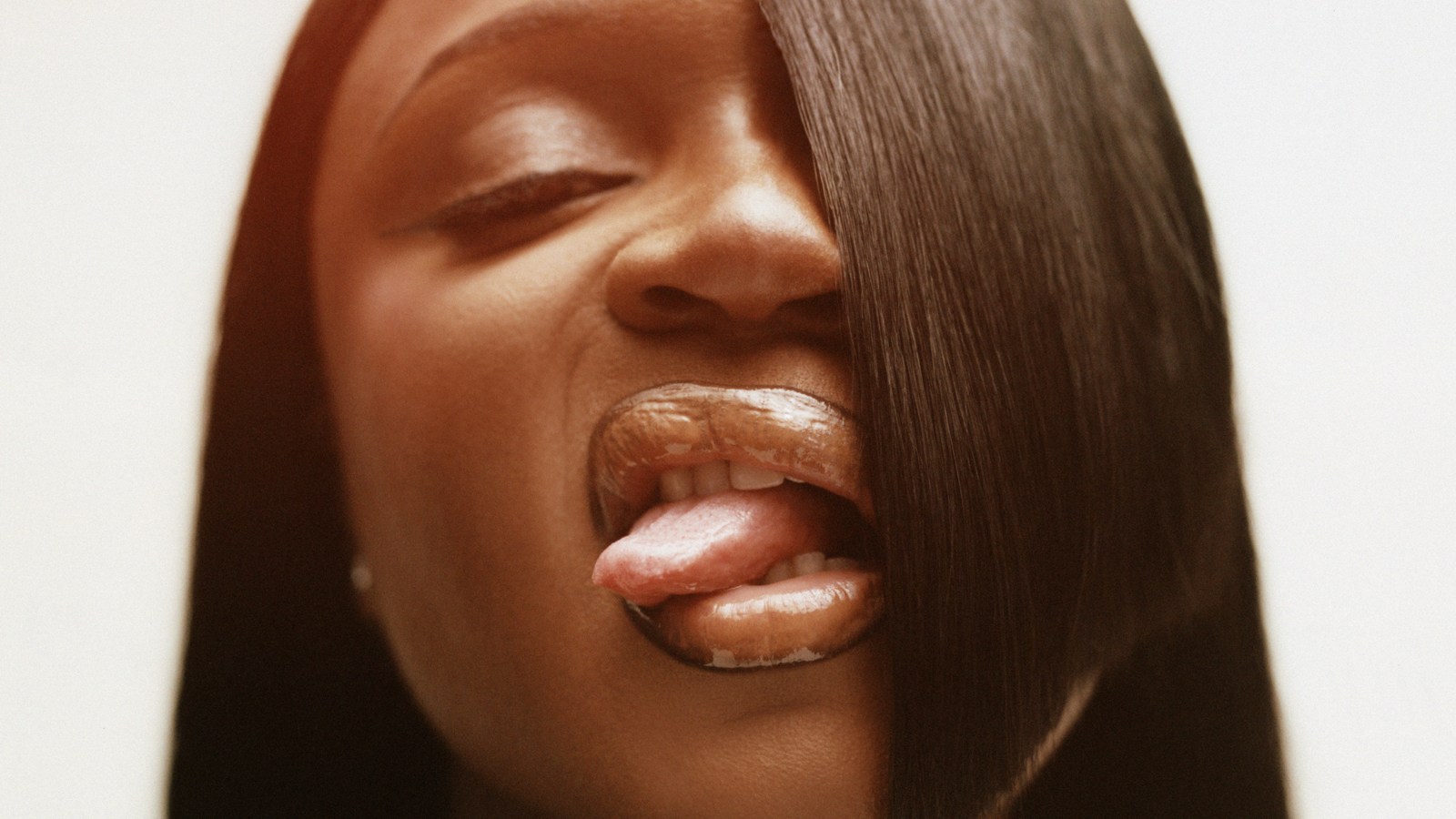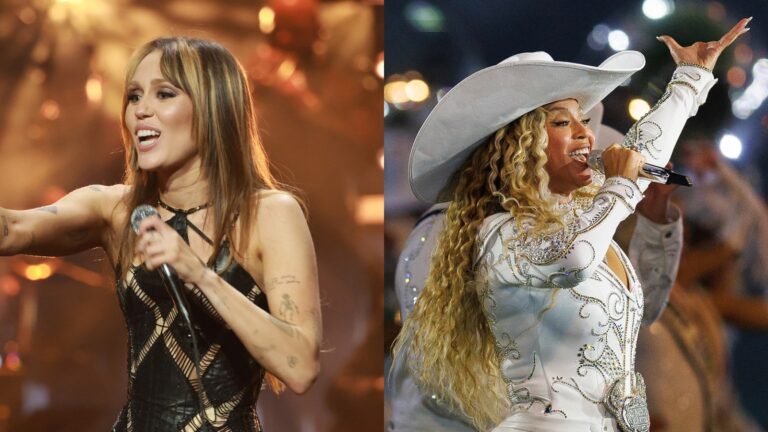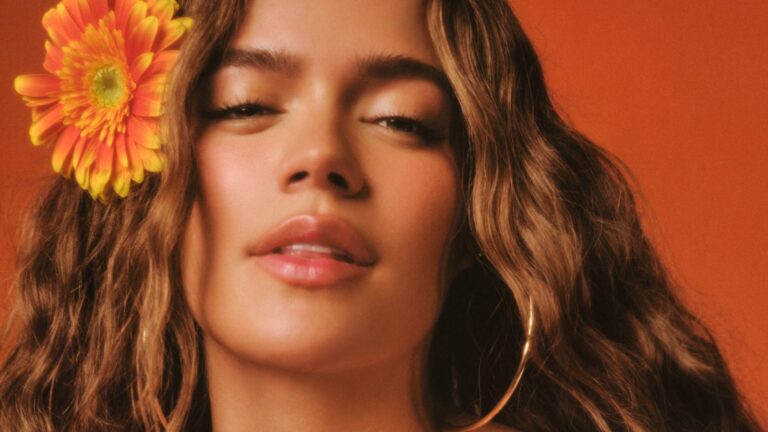W
hen you meet Amaarae, it’s hard not to notice how much deeper her speaking voice is compared with the sweet falsetto she constantly deploys in her music. It’s all intentional: “There’s a sensitivity and a vulnerability that I get to tap into in my music that isn’t very easy for me to express,” she tells me under the shade of a teahouse at the Japanese Garden outside of Los Angeles. “Deep down, I’m a sensitive and mushy person.”
Amaarae has been thinking a lot about who she really is. She’s currently hard at work on Black Star, her upcoming third album, out later this year, which sees her diving deeper into her identity as both a woman and an artist. The album title is a triple entendre referencing herself, the Ghanaian flag, and the Black cultural roots of the dance music she blends on the record. For the 30-year-old musician, whose real name is Ama Genfi, there’s been a power to finding herself — and allowing herself to be vulnerable as an artist has given her strength. “There’s a switch that flips. There’s a confidence and big-dick energy to it,” she says. “It’s a version of me that takes over.”
Black Star arrives two years after Amaarae released her critically acclaimed LP Fountain Baby, which featured the avant-garde alt-Afropop hit “Angels in Tibet,” and follows a string of high-profile moments that have cemented her as an artist’s artist. Over the past couple of years, she opened for Kaytranada and Sabrina Carpenter, collaborated several times across Childish Gambino’s Bando Stone & the New World, and she made history as the first Ghanaian solo female act to perform at Coachella. “[It] was a huge turning point because before, my shows would mainly be, like, young Black kids, young African kids,” she says. “There’s clearly been a shift here. Now, it’s much more of a global representation and melting point, which brings me a huge sense of pride.”
She’s seen her fan base expand, stretching out to include megastars. When she first heard she’d landed the tour slot with Carpenter, for example, Amaarae was skeptical: “I was like, ‘What the hell do Sabrina Carpenter know about some motherfucking Amaarae?’” But Carpenter later told her she and her friends played her music all the time. “She’s a freak just like me,” Amaarae says. “It’s just a different kind of expression: Hers is bright and colorful; mine is dark and edgy. But we’re both saying the same thing: We’re sexual beings, and we are women who feel free and confident in that.”
A global symbol
That no-holds-barred sexual freedom has defined a lot of Amaarae’s lyricism in the past. (A sample lyric: “I like my coffee with some head in the morning,” from her song “Disguise.”) Her liberated approach continues on the new album: “Black Star to me is the genesis of me feeling sure and confident in myself as a grown woman, number one, and knowing exactly what my message is, how I want to tell it to the world,” she says.
Part of her process also meant weaving threads from African sounds and the Black origins of dance music. “I’m taking my culture and I’m synthesizing it in a way that feels unique and fresh to me… I wanted to take a genre that needs to go back home to its roots and merge that with my African roots and hip-hop and create a new world,” she says.
This album, she explains, took shape as she began to feel more embraced by people in Ghana, many of whom misunderstood or had preconceived notions about her and her family. Amaarae was born in the Bronx but grew up between the United States and Ghana, with parents in high-profile roles in Ghana. Her father was a politician and banking executive, and her mother was the first female chairperson of Access Bank Ghana. She says many people assumed she was just a privileged kid making music. “They didn’t think I had anything to offer because they didn’t feel like I could speak from the perspective of the everyday man,” she explains.
Amaarae understands why people may have thought that way, but notes that she doesn’t “really have much of a relationship” with her father, and that her mother “has worked her ass off for years and years to give my brother and me a good life.” “I don’t need to apologize for that,” she explains. However, she does feel like things have shifted. “With this album, I want to stamp it as ‘I’m from Ghana, I love being Ghanaian.’ I want to be a global symbol,” she says.

Most of all, with Black Star, Amaarae says she wanted to have fun. For Fountain Baby, the singer says she took things “too seriously” and allowed for “too many cooks in the kitchen” to decide how the album ended up sounding. This time around, the musician (and her go-to producer Kyu Steed) took the driver’s seat for the project, and traveled to Brazil to meet with several baile-funk producers. She also worked with El Guincho and Bnyx, who introduced more alternative, free-flowing sounds. “They make music not for money or hits, but the expression,” she says. “And that is so beautiful. I wanted to feel free like that.”
Breaking through
Amaarae was ready to move past some of the harder moments that inspired Fountain Baby. “It’s a time stamp of a very specific time that felt like hell on Earth,” she says. She won’t go into details about what that looked like, but explains that the music from that period “equipped me with a lot of the knowledge that I have today to navigate the world.”
She approached collaboration this time with a fresh mindset, shaped in part by her experience on Childish Gambino’s Bando Stone album, where she embodied a character that Donald Glover, she says, “pulled out” of her. “He’s really good at getting an interesting performance out of you. Half the time, I didn’t realize that’s what he was doing, but it was masterful,” she says. “Now, when I bring other people into my world, I’m more intentional. They all have to operate as characters in this world.”
The new era kicks off with “S.M.O.,” or “Slut Me Out,” which hears her asking a lover to “scream and shout” in bed over a retro-futuristic dance energy that’s ready for a Boiler Room DJ set. One of her favorite tracks? “Star Killa,” where she chants “ketamine, coke, and molly” over a hypnotic rhythm. “It’s bold and audacious,” she says. “All the suits have gone back and forth like, ‘I think you should change the name or the lyrics.’ But when I preview it, people come to me and say, ‘This is the record.’ I think it’s just nice sometimes to say the thing as it is.”
The goal now with Black Star? “Global takeover,” Amaarae says bluntly. “My soul can’t rest until I feel like I’ve made a project that resonates in a really huge way globally. The last frontier is to make both a commercial and critical success.
“Above all,” she adds, “I’m a Black fucking star.”
Production Credits
Styling by AARON CHRISTMON and MARQUISE MILLER. Hair by MAYKISHA BOWERS. Makeup by NNEOMA CHISOM NWAKA. Photo assistance REID CALVERT. Styling assistance DEONNA BOLDEN. Outfit by BALENCIAGA



